This article was co-authored by wikiHow Staff. Our trained team of editors and researchers validate articles for accuracy and comprehensiveness. wikiHow's Content Management Team carefully monitors the work from our editorial staff to ensure that each article is backed by trusted research and meets our high quality standards.
There are 9 references cited in this article, which can be found at the bottom of the page.
This article has been viewed 46,552 times.
Learn more...
Whether you've suddenly discovered a love of dance or been passionate about it for a long time, you likely want to put on your dancing shoes! However, maybe your parents aren't sold on the idea. Start by bringing up the topic and then work on offering solutions to your parents' concerns. Whatever way the conversation goes, make sure to be respectful and show maturity so that you're more likely to get a "yes" in the future.
Steps
Bringing up the Topic
-
1Pick a good time to have the conversation. Don't ask your parents when they're running out the door or trying to fix dinner. Choose a time when they are relaxed and have time to listen to you. They'll be more open to talking then.[1]
- If you're not sure when a good time to talk would be, ask. You could say, "Hey, I'd like to talk to you two about something important. When would be a good time?" However, when you ask, be prepared to sit down right then, as your parents may decide now is a good time.
-
2Start by telling your parents exactly what you're asking for. In this case, you want permission to let you take dance lessons or join a team. Then, you can ask your parents to listen to your reasons.[2]
- For example, you might say, "Can I talk to you about something? I'd like to get your permission to join dance. Before you say yes or no, will you hear me out?"
Advertisement -
3Bring up positive points about joining dance. Come up with some talking points ahead of time before you discuss it with your parents. Include reasons why dance could be beneficial to you and your academic work and why you want to do it.[3]
- For instance, you might note that dancing can improve your work ethic, encourage creative and critical thinking, and help your memory skills.
- You might note that it's a way to build friendships and a good way to keep fit.
- For your personal reasons, you might say, "I've wanted to dance for a long time. I love the way that dance allows you to express yourself with your body, and I could make some new friends, too."
-
4Ask your parents what they think and listen. Once you're done, it's your parents' turn to talk. Ask what their thoughts are on the subject. Don't just dismiss what they have to say. Really listen to them and consider what they're saying and why.
- For instance, you could say, "Well, those are my points. What are your thoughts on me joining dance?" If they say, "No" or "I'm not sure," you might say, "What are your concerns?"
-
5Write your parents a letter if you can't face them directly. Sometimes, it's hard to think clearly while you're having a discussion with your parents. You may get defensive or angry, and that doesn't help your case. Instead, try writing it out in a letter. Clearly state what you want, why you think it's positive, and the reasons you'd like to do it.[4]
- For example, you might write, "Dear Mom and Dad, I wanted to write you a letter because I'm having trouble expressing my feelings. I would like you to consider letting me join dance. Before you say 'no,' hear me out, please. Here are my reasons why I think it's a good thing and why I want to do it..."
Addressing Your Parents' Concerns
-
1Tell your parents you understand where they're coming from. In any discussion, it's good to let the other side know you can understand how they feel. Tell them you empathize with them before diving into ways you can address their concerns. That will help bridge the divide between you and your parents.[5]
- For example, you might say, "I do understand what you're saying about schoolwork. I know that school is very important, and I know you want me to focus on getting good grades. I totally get where you're coming from."
-
2Brainstorm ways you can overcome the obstacles together. Whatever your parents' objections are, you can work together to come up with solutions. When your parents say they're worried about a certain aspect of you dancing, talk about ways you can make them more comfortable.
- For example, if your parents are worried about you getting back and forth from dance, you might brainstorm ideas about how you could get there. Maybe you could ride with a friend, walk, ride a bike, or take the bus.
- If your parents are worried about dance taking too much time, work together to come up with a schedule so you can show your parents you can get everything done.
-
3Show your parents how dance might help your schoolwork. Many dancers actually see an improvement in their academics, and at the very least, most are able to maintain their grades. Dancing builds a solid work ethic, and it helps you learn how to problem-solve, both of which will benefit you in school.[6]
- For instance, show your parents that dance builds your critical thinking skills,[7] and dancers do better on memory tests than non-dancers.
- You could also make a promise that if your grades start to slip, you'll quit dance.
-
4Discuss ways you can help financially. Dance can be very expensive, and your parents may not be able to afford it. However, there are ways you can assist them. For instance, some dance schools offer scholarships for students, while others will let you work at the school to help pay for your classes.[8]
- You could also offer to get a part-time job or take on small side jobs like babysitting. In addition, tell your parents you'll buy used shoes and other items as often as you can.
-
5Discuss a second major if they're wondering about job prospects later on. Your parents are likely thinking ahead to college and your career, and they may feel dancing isn't a career. The good news is that you need a college degree to dance with most productions or companies, and while you're getting a degree in dance, you can get a second major in something else.[9]
- For instance, you could get a degree in something like business or even dance management.
-
6Have an expert meet with your parents. You may not be able to address all of their concerns. If that's the case, ask if they'll meet with a dance teacher or someone involved with the dance school you'd like to attend. Most of them are more than willing to sit down with parents, and then they can have all their questions answered.
Showing Maturity
-
1Be respectful to your parents. No matter what, be polite and respectful while you're having this conversation. Listen politely to your parents' concerns without rolling your eyes, sighing, or generally being annoying. Being respectful will help show your parents you're ready for a responsibility like dancing.[10]
-
2Stay calm and avoid temper tantrums. You may find yourself getting angry as you listen to your parents. That's natural if they're telling you that you can't do something that you want to do. However, yelling, screaming, kicking, or calling them names is just going to prove their point that you're not ready.
- Instead, try to stay calm. Speak in a regular tone of voice and avoid stomping off if you get angry.
- If you find both you and your parents are getting angry, try taking a break. You can revisit the conversation later.
-
3Give your parents honest, direct information. Don't try to trick them into letting you dance by telling them what they want to hear. For instance, don't say it won't cost anything if you know it's going to cost quite a bit. They will only find out later, and then you'll be in more trouble.[11]
- You may ruin your chances of dancing in the long-term if you lie to dance in the short-term.
-
4Take "no" for an answer for now. If you have a good, open discussion with your parents and they still say "no," don't despair. It's important for you to accept this decision now, as that shows maturity. However, keep in mind that circumstances could be different in the future, and if you're willing to show maturity now, they may change their minds.[12]
- For example, you might say, "I'm really disappointed, but I understand why you're saying no. Could we possibly revisit another time?"
Community Q&A
-
QuestionWhat can I do if I want to join a ballet class, but my parents are busy with my sister's activities?
 Community AnswerYour parents should care about you just as much as your sister. Just follow the guidelines in the article and ask to get your fair share.
Community AnswerYour parents should care about you just as much as your sister. Just follow the guidelines in the article and ask to get your fair share. -
QuestionHow can I convince my parents if the answer is always the same, "If you dance you might break your back"?
 Community AnswerYou could point out the extreme unlikelihood of something like that happening, and/or choose the safest form of dance, which would probably be tap. Tell them thousands and thousands of people safely go to dance classes every single day.
Community AnswerYou could point out the extreme unlikelihood of something like that happening, and/or choose the safest form of dance, which would probably be tap. Tell them thousands and thousands of people safely go to dance classes every single day. -
QuestionHow do you get your parents to let you do ballet?
 Community AnswerTell them you've been wanting to do ballet for some time now, and it can help with balance.
Community AnswerTell them you've been wanting to do ballet for some time now, and it can help with balance.
References
- ↑ https://kidshealth.org/en/teens/talk-to-parents.html
- ↑ https://kidshealth.org/en/teens/talk-to-parents.html
- ↑ https://www.dancespirit.com/deal-with-parents-in-dance-2549930658.html
- ↑ http://www.yourlifeyourvoice.org/Pages/tip-letter-to-your-parents.aspx
- ↑ https://kidshealth.org/en/teens/talk-to-parents.html
- ↑ https://www.dancespirit.com/deal-with-parents-in-dance-2549930658.html
- ↑ https://files.eric.ed.gov/fulltext/ED529766.pdf
- ↑ https://www.dancespirit.com/deal-with-parents-in-dance-2549930658.html
- ↑ https://www.dancespirit.com/deal-with-parents-in-dance-2549930658.html
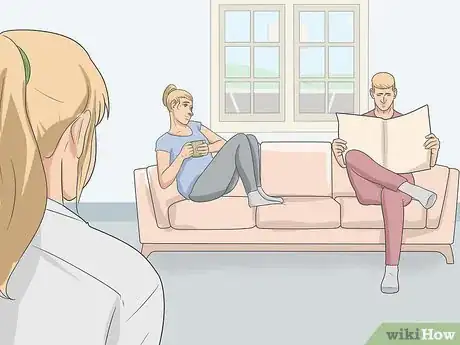

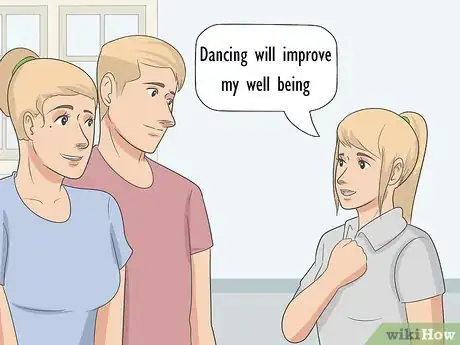


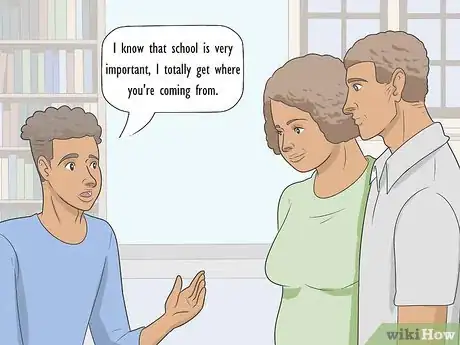
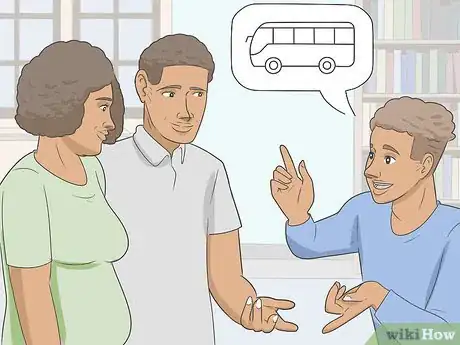






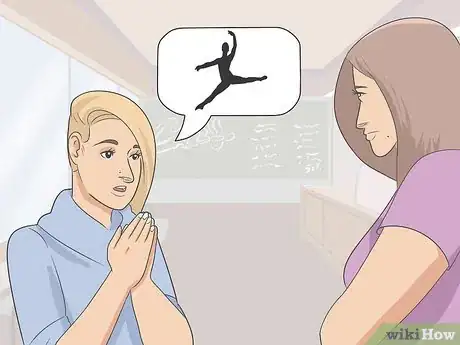
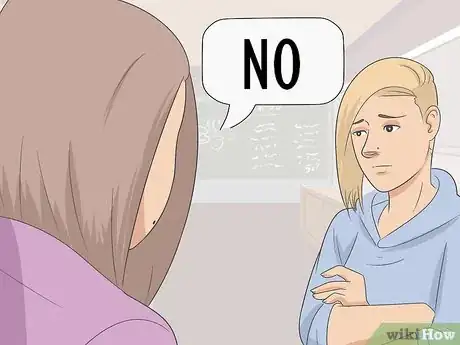



-Step-19-Version-2.webp)


















-Step-19-Version-2.webp)


































